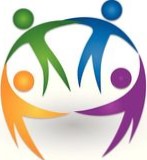The kids we see at the at the Ocalenie Foundation safe space for children in the Ukrainian Refugee Reception Point / Humanitarian Aid Center in Przemyśl, Poland seem like one big family — on several dimensions. First, it’s not uncommon for a single nuclear family to have 4 or 5 kids. Second, these families are travelling together from Ukraine, maybe even from the same village or local community, so they often know each other by the time they reach our safe space. Sometimes they were even neighbors back home, or even cousins. Third, upon entering the Ocalenie safe space play area, the kids become defacto siblings, at least temporarily for the time they remain with us, and we volunteers serve as surrogate parents.
I only have a single sibling of my own (a sister who was just one year behind me in school), and I only have one child of my own, so being a surrogate parent in such a large family is quite an eye-opening and somewhat hair-raising experience.
For instance, because we only have three bicycles and two scooters in our play area, and at any one time they may be coveted by as many as a dozen different kids, I find myself regularly called on to mediate sharing and allocation disputes. Imagine the bickering that goes on between the kids. Now, keep in mind that I can’t understand any of the stories, complaints or rationales supporting their various arguments (because I am still taking baby steps with learning Ukrainian). Also, keep in mind that the some of kids are natural brothers and sisters, while others are only “temporary” siblings while they are in our safe space, and often I can’t tell for certain when two biological cousins who have grown up together are bickering, versus when it’s two kids who may have just met. That makes a big difference. So I suppose sometimes I intervene in arguments that cousins might resolve more satisfactorily between themselves; on the other hand, I really watch body language to try to intervene in activity that looks like bullying and big kids dominating smaller kids. When the situation gets hot, I often have to make a wait list and run a timer to make sure kids take reasonable turns and nobody “hogs” a bike for too long. Some of the kids understand the idea of queueing up to take turns, but others actually seem not to understand — for them, every time a bike changes hands, it’s a free-for-all opportunity. Some of the alpha-type personalities will even flag down riders and try to take bicycles. Or sometimes one rider will decide to turn over a bicycle to another close friend or sibling, instead of turning it back in to the “common pool.” I generally allow that, but I don’t add time to the “turn” (unless the successor/beneficiary happens to be a shy child who rarely has a chance to ride, in which case I may let them ride a little longer, unless the next kid on the list is really clamouring for their turn right away.
But on the redeeming side of this crazy experience is seeing how the older kids sometimes really look out for the younger. Sometimes an older sibling will carry a baby sib one of the bigger bicycles, sometimes they will help a toddler use one of the little scooter-cycles.
These are scrappy kids. The younger kids, especially the toddlers, seem to know no fear, marching around among the whizzing bicycles and flying balls. They don’t get hit very often, and even when they do get accidentally knocked off their feet or smacked with a ball they rarely cry or fuss about it, even though I’m sure it smarts. Our “safe space” is also a “school of hard knocks”.
